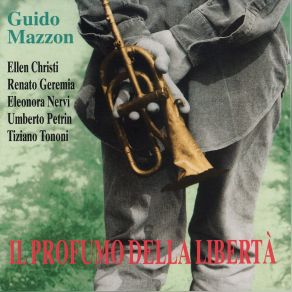Il profumo della libertà / Il profumo della liberta
Download links and information about Il profumo della libertà / Il profumo della liberta by Guido Mazzon. This album was released in 1992 and it belongs to Jazz genres. It contains 7 tracks with total duration of 01:01:42 minutes.

|
|
|---|---|
| Artist: | Guido Mazzon |
| Release date: | 1992 |
| Genre: | Jazz |
| Tracks: | 7 |
| Duration: | 01:01:42 |
| Buy it NOW at: | |
| Buy on iTunes $8.99 | |
Tracks
[Edit]| No. | Title | Length |
|---|---|---|
| 1. | Il profumo della libertà | 6:15 |
| 2. | Il vecchio sognava i leoni | 15:06 |
| 3. | Ad Libitum | 4:48 |
| 4. | Old Tales & New Songs | 10:47 |
| 5. | Appunti per un autoritratto | 11:54 |
| 6. | Michele, non temere: verranno tempi migliori | 8:01 |
| 7. | Lullaby for Duccio | 4:51 |
Details
[Edit]Finally, there is an album that celebrates the great diversity of trumpeter Guido Mazzon's many talents as a composer, arranger, soloist, and jazz theorist. This set of seven long selections looks deeply into the many facets of modern music that Mazzon has explored and continues to exploit with his lyrical genius, radical approach to experimentalism, and his deep love of jazz tradition. In settings that range from duet to sextet, Mazzon and his collaborators — which include the incomparably wonderful Ellen Christi — look deeply into the roots of jazz's vanguard lineage to forge a true Italian avant-garde sensibility. The title track opens the album with a small motif from Ornette Coleman's "Lonely Woman," which is abandoned almost as soon as it is articulated in favor of a slow, languid, sweeping, wordless vocal from Christi. Mazzon solos around her, sliding lines in between her breaths and soaring over her voice as pianist Umberto Petrin creates a series of changes that can be referenced for tonal modalities over and again. When the full sextet appears on Mazzon's "Il Vecchio Sognava i Leoni," with Renato Geremia's violin and clarinet adding to a colorful grouping which includes Elenora Nervi's tuba, as well as the standard quartet of the previous selection, we hear the deep lyrical leanings of Mazzon toward Italian folk song and the way it articulates itself in free improvisation as thematic anchor and idiomatic stipulation in harmonic constructs and tonal lightning rod — microtonal free association and whole-tone modulation intertwine through the center of a traditional melody and turn them both, as well as any idea of counterpoint, inside out. Hence, the influences of 20th century composers György Ligeti and Bruno Maderna come to mind. This is a brilliant record that showcases how wide-ranging the Italian avant-garde is in its thinking and playing. Most importantly, it showcases the compositional brilliance of Guido Mazzon, a jazzer who takes the music of the entire universe into consideration when he sits down to write.